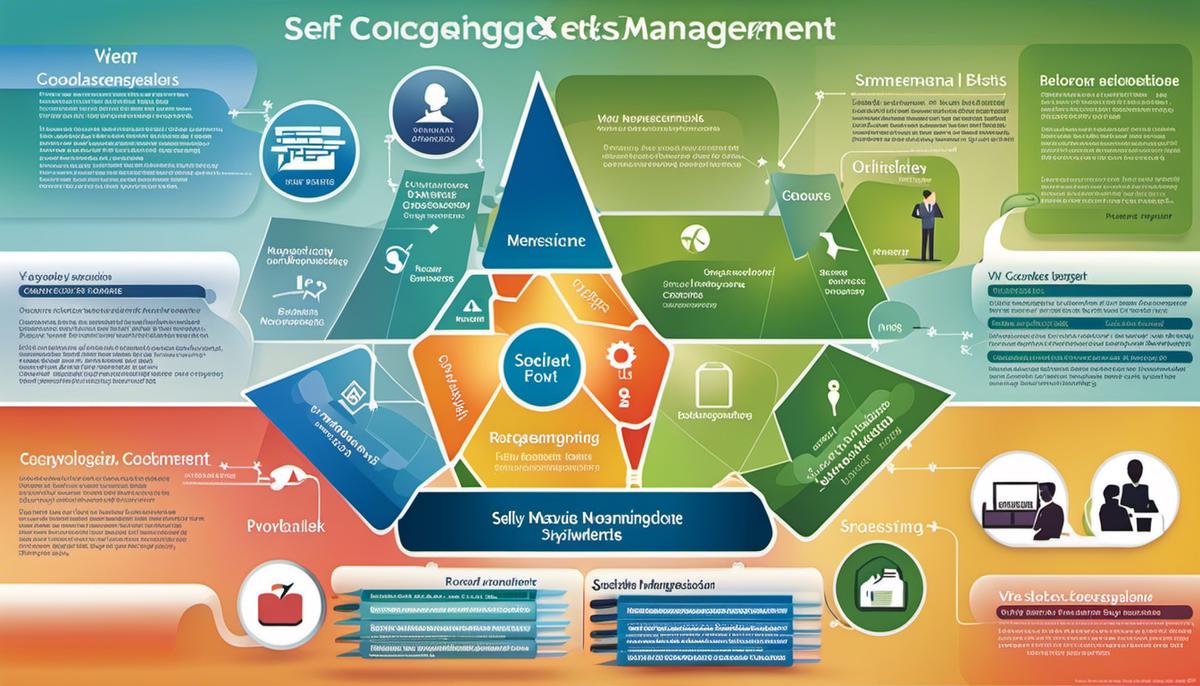Self-management acts as the principal architect in both your personal and professional life. It involves an array of dimensions which include emotional regulation, self-discipline, goal-setting, and time management. Regardless of who we are or what we do, each day presents us with opportunities to master these skills, thereby enhancing our ability to navigate life’s ups and downs. The essence of this discussion is to provide an indepth understanding of self-management, exploring its significance, and how it influences various spheres of our lives.
Understanding Self-Management
Understanding Self-Management
Self-management refers to an individual’s ability to manage their own personal and professional responsibilities effectively and efficiently. It’s about the ability to not only set a course for one’s life, tasks, and goals but also to steer the proverbial personal ship through day-to-day decisions. This concept is grounded in an individual’s control over their thoughts, behaviors, and emotions.
The importance of self-management can’t be understated. Successful self-management can lead to increased productivity, better work-life balance, higher job satisfaction, and an improved sense of well-being. Besides, it may also positively impact your employability, career advancement, and job performance. It plays a critical role in interpersonal relationships and can be instrumental in handling personal issues, coping with stress, and fostering an overall sense of satisfaction with life.
An Introduction to Self-Management
Self-management is a multifaceted concept integral to personal and professional success. It consists of vital components such as goal setting, time management, self-discipline and emotional regulation.
- Goal Setting: Goal setting is a fundamental element of self-management. By developing realistic, concrete and actionable objectives, individuals are provided with a clear path towards attaining their desired outcomes. This empowers them to focus their energy, manage their time effectively, and keep track of their progress.
- Time Management: A second crucial component of self-management is time management. Getting a hold of one’s own time enables them to rank tasks based on their urgency or relevance. Several strategies may come into play here, such as forming routines, establishing deadlines, or using aids like calendars and to-do lists.
- Self-Discipline: Self-discipline equates to an individual’s capacity to regulate their actions, suppress emotional reactions, sidestep distractions and defer gratification. This valuable trait ensures adherence to personal and professional schedules, sustaining consistent performance despite adversities.
- Emotional Regulation: This dimension involves managing and controlling personal emotions, particularly during stressful or challenging times. By mastering this skill, individuals can maintain composure and enhance their ability to make rational decisions.
Effective self-management is a comprehensive skill that profoundly influences a person’s life domains. Developing competency in this area is not just desirable, but also practical. Through deliberate self-management strategies, individuals can maximize their productivity and efficiency, thereby facilitating their personal and professional development.

Strategies for Effective Self-Management
Applying Self-Management in Everyday Life
Simply put, self-management is about an individual’s capacity to plan, implement, and regulate their own behavior. By thoughtfully managing our thoughts, emotions, and actions, we can strive to meet personal objectives. Enhancing self-management skills can bring a wealth of benefits – from boosting productivity to promoting mental health, improving personal relationships, and fostering a higher degree of overall well-being.
Awareness and Goal Setting
One critical strategy for self-management involves cultivating self-awareness. This involves understanding your feelings, triggers, strengths, and weaknesses. By knowing yourself better, you can set realistic personal goals and lay out a specific path towards achieving those targets. After setting the targets, break them down into manageable tasks and activities, creating a realistic plan of action.
Time Management and Organization
Effective time management is another important strategy in self-management. Organizing your tasks and balancing your work-life responsibilities can significantly improve productivity and reduce stress. Tools such as digital calendars, planners, and task management apps can assist in managing your time effectively. Allocating specific durations for work, rest, and leisure activities can also aid in maintaining a healthy balance.
Emotional Regulation
Managing emotions effectively is a core aspect of self-management. Emotional self-regulation involves identifying and understanding one’s emotions and using methods to control emotional reactions. Mindfulness, meditation, and breathing exercises can be beneficial for managing stress and maintaining calm in challenging situations.
Health and Self-Care
Good self-management includes taking care of your physical health. Regular exercise, maintaining a healthy diet, getting sufficient sleep, and regular medical check-ups are all important elements. Likewise, self-care activities such as engaging in hobbies, spending time with loved ones, and taking time for relaxation can support emotional well-being and overall productivity levels.
Learning and Adaptability
Continuous learning is a significant strategy for self-management. This involves seeking new knowledge, building skills and capacities, and adapting to changes and challenges. Transforming mistakes or failures into learning opportunities is another crucial aspect of this process.
Mindset and Self-Discipline
Maintaining a positive mindset and practicing self-discipline are crucial components of self-management. A positive attitude can boost resilience, improve problem-solving capabilities, and foster healthier relationships. Additionally, self-discipline—making conscious choices, following through on commitments, and resisting negative impulses—is fundamental in achieving long-term goals.
Professional and Personal Growth
Effective self-management also plays a crucial role in personal and professional growth. It involves setting career objectives, acquiring necessary skills and knowledge, and proactively seeking opportunities for advancement. On a personal level, self-management can lead to improved life satisfaction, stronger relationships, and greater emotional resilience.
Comprehending and incorporating these strategies into your everyday routine can significantly enhance your self-management skills, which in turn, improves your overall quality of life.

Overcoming Challenges in Self-Management
Delving Into the Concept of Self-Management
Self-management represents an individual’s capacity to take control of their emotions, behaviors, and thoughts while taking charge of their personal and professional goals. This encompasses effective time management, prioritizing tasks, taking the initiative, maintaining organization, and the ability to work autonomously. People who possess strong self-management skills can boost their productivity, elevate their performance, and realize their objectives more efficiently.
Challenges in Self-Management
Despite its importance, many individuals struggle to manage themselves effectively, primarily due to several common challenges. The first challenge is procrastination, which refers to the practice of postponing tasks or decisions that must be completed. This habit can negatively impact productivity and lead to stress and anxiety.
Lack of motivation and discipline is also a major challenge in self-management. Without a clear sense of purpose or a strong commitment to personal and professional goals, individuals may find it difficult to stay motivated and disciplined.
Busy schedules and multiple responsibilities can also make it difficult to manage time effectively. In the digital age, another common challenge is dealing with distractions and interruptions, such as text messages, emails, and social media notifications.
Overcoming Procrastination
One of the most effective ways to overcome procrastination is by breaking large tasks into smaller, manageable tasks. It also helps to set specific, measurable, achievable, realistic, and timely (SMART) goals. Self-imposed deadlines can also be helpful in overcoming procrastination and boosting productivity.
Boosting Motivation and Discipline
To boost motivation and discipline, individuals should first understand their why – the core reason behind their goals. A clear sense of purpose can provide motivation even in challenging circumstances. Regularly reminding oneself of this purpose can also help to maintain discipline. It is also helpful to incorporate routines and habits that support the achievement of these goals.
Managing Time Effectively
Effective time management skills are essential for self-management. One way to improve time management is by using tools like planners, calendars, and apps that can help to prioritize tasks and set reminders. There is also a need for regular breaks to avoid burnout and maintain productivity.
Reducing Distractions and Interruptions
As for distractions and interruptions, it may be necessary to establish personal boundaries, such as setting specific times to check emails or social media. Turning off unnecessary notifications and using productivity tools can also help.
Building Self-Management Skills
Overcoming challenges in self-management is a process that requires consistency, patience, and perseverance. Regular self-reflection, developing a growth mindset, seeking feedback, and continuous learning can enhance self-management skills and contribute to personal and professional success.

The journey of mastering self-management is filled with numerous challenges, but by leveraging the right set of strategies and effectively addressing these obstacles, personal and professional growth can be significantly achieved. While self-management skills can never be perfected, there’s always room for improvement. And it’s this competence of managing oneself that spell out the difference between living life and thriving in it. Remember, the power to manage your life is in your hands, and as you unlock the full potential of self-management, you are setting yourself up for a fulfilled, well-balanced life.

